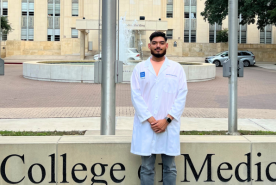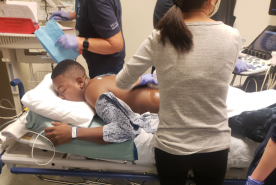When a family member develops kidney failure, the whole family is affected, even if they don't all show it. Everyone has questions about how kidney failure will affect their own and the patient's life and future plans. If a parent develops kidney failure, children have questions too. Some children are outspoken and ask lots of questions, while others may be quieter and afraid of the answers. The goal of this brochure is to open lines of communication between parents and children of all ages.
The questions included are only examples of the kinds of concerns a child might have. If your child doesn't express his or her concerns, the questions included may help you begin a discussion with the child about living with kidney failure. The answers provided are intended only to give you an example of the type of response you might make. Naturally, the words you use are up to you and depend on your child's age and understanding. Most experts agree that it is important to answer the questions honestly, without reading too much into the them or giving more information than is asked for. If you feel you need help either to meet your child's need for information about kidney disease and treatment or to help you and your child cope with your kidney failure, talk with your social worker.
Chronic Kidney Disease
1. Why are you so sick all the time?
Kidneys do a lot of things to keep us healthy. One of these is cleaning poisons from the blood. Because my kidneys are not working as well as they used to, some of these poisons are building up in my blood. When the kidneys don't work the way they're supposed to, it is a little bit like a washing machine that doesn't work right. It may look fine from the outside, but inside there are many important things that do the work. If something doesn't work right, the washing machine doesn't do its job of cleaning the clothes.
2. Why are you in a bad mood?
My being in a bad mood sometimes is not your fault, and does not mean that I don't love you anymore. There are many reasons why I may feel "down" sometimes.
- I am worried about my health. I worry about the future.
- I don't feel good. I'm sick.
- I don't feel like I used to. I want to do everything that I used to be able to do, but now I can't.
- Things bother me more than they used to. I have lots of worries, and don't feel well enough to think about all of them.
- I feel angry, or frustrated, or sad, or scared when I think about being sick.
- Often when I snap at you, or seem impatient or angry, I'm not angry at you. I just don't have as much patience as I used to, or as much as I wish I had now.
3. Why don't you play with me anymore?
Because I have an illness does not mean that you can't play or make any noise around the house. You can still ask me for things, even though I may seem grouchy sometimes.
Sometimes, I don't feel well enough to play like I used to. Right now, I'm feeling too tired for active things. I'd like to be able to play like I used to, and maybe when I get used to my treatment and start feeling better, I may be able to do more. But right now, I'm not strong enough. In the meantime, we can try to think of other things we could do together, so that we can keep playing and having fun together. Maybe we can think of some things right now that we can do, like puzzles and games, maybe watching a movie or reading a book.
4. Why do you have to go to the doctor?
The doctor needs to watch how my kidneys are doing. That helps me take good care of myself so I can help to keep my kidneys working longer. When I go to the doctor's office (or clinic or hospital), many people work together to help me feel the best I can feel. Doctors, nurses, social workers and dietitians all work together to help me.
5. Are you going to die?
I may not live as long as I would have, if I didn't have this kidney disease. I'm not going to die tomorrow, or anytime soon, and I hope I will live for a very long time. But everyone dies sometime, so yes, sometime I will die. I am making changes in the way I live, to help me stay alive longer.
6. Why do so many things have to change in our lives?
Because I'm sick, I can't do all of the things I would like to do. Like have a job, or take care of the house and family. We need to work together to keep our family running smoothly. Each of us will have to learn new jobs, and each of us can do things to help. Like cutting the grass. Bringing in the groceries. Staying with a neighbor sometimes after school if I can't be there because of a doctor's appointment.
7. Will this kidney disease last forever?
Yes. I will have kidney disease for the rest of my life. But, with the help of the health care team, some things about it may get better. We can do some things as a family to make it better. First, we can divide the jobs that we have to do. Everyone can help. We need to develop new hobbies and activities to do together to have fun. We need to let everyone have his/her own way of handling the worry. Some people may be angry, some sad, some may want to be by themselves, and some people may want to talk about it. Each person has his/her own way, and each way is okay.
8. Can this happen to me?
Some kidney diseases run in the family. (Note: Your doctor can give you specific information about your disease.) However, you cannot catch kidney disease.
Hemodialysis
1. Why do you have a band-aid on your arm?
To cover up the hole where the needle was during dialysis. This is for the same reason that you put a band-aid on your knee if you scrape it--to keep your skin clean while it's healing.
2. Does dialysis hurt?
No, it doesn't hurt, but putting in the needles does hurt for a minute. It is hard to sit still for such a long time, and sometimes I don't feel very good.
3. Why are you away so much?
Because dialysis takes a long time to clean my blood.
4. What does the dialysis machine do?
It cleans my blood like a washing machine cleans the dirty clothes. If my kidneys worked the way they should, they would clean my blood all the time. Since they don't, I have to dialyze often.
5. Can I visit you?
Many units let families visit. I can ask my treatment team to help us plan a visit, or a time for you to see the unit.
6. Will we still be able to go on a vacation?
Yes, we will still be able to take our family vacations. But, it will take a little more planning, and I will have to take time out for my treatment.
Peritoneal Dialysis
1. What is the catheter for?
The tube lets me put fluid into my belly to do some of the cleaning work that my kidneys used to do.
2. What does the fluid feel like?
The fluid makes me feel full, like I just ate a big meal. It doesn't hurt.
3. Why do you have to wear a mask?
I have to wear a mask so that germs can't get into my belly.
4. Will the treatment ever end?
I will always need some kind of treatment. I might change kinds of dialysis, or get a transplant.
Transplant
1. Will I get to visit you when you go to the hospital for a transplant?
Most hospitals will allow visitors. Most will arrange a time for healthy children to visit a parent.
2. Will the operation hurt?
Yes. All operations hurt some. The medical team will give me medicines to keep me comfortable while I am healing. After I go home, I might be sore for a while, until I heal.
3. Will you wake up?
Yes. They will give me medication to let me be asleep during the operation. When that medication wears off, I will wake up.
After Transplant
1. Why can't I kiss you? Why can't people come to visit?
When I first have a new kidney, some of the medications will make it hard for my body to fight germs. During this time I will try to stay away from people who are ill.
2. Why do you have to take medicine?
To help the new kidney keep working, I must take medication every day.
3. Will you have to go back to the hospital?
I will have to see my doctor often to have my blood checked. If there is a problem, I might have to go back to the hospital for a few days to fix the problem.
4. Will you ever have to go back on dialysis again?
I hope not, but if the new kidney stops working, I would do dialysis again. I might also choose to get another transplant.
5. Where did your kidney come from?
(In the case of a living donor): Most people have two kidneys, and need only one. A healthy person can give one of his/her kidneys to a loved one.
(In the case of a cadaveric donor): Sometimes, when a person dies, the person's family chooses to give his/her kidneys to people who need them.

















